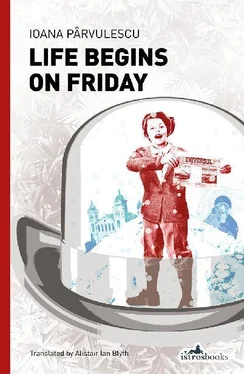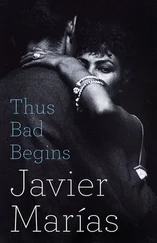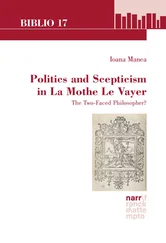The director, Mr Luigi Cazzavillan, was not present. He comes and goes as he pleases, like all directors, and so we were able to choose among the things undisturbed. We laughed so much that I forgot all about my troubles. What did we laugh at? — At how the toys were presented; each with a written explanation. If only you could stock up on laughter for when things go badly for you! If only you could store it on a shelf in the larder or cellar and take it out when you are feeling depressed. But perhaps in the future someone will succeed in doing it, because nothing is impossible for the man of the future. I stocked up on laughter by copying a few of the presentations (even now, as I transcribe them, I burst out laughing). I would also like to read them to Jacques.
‘ Mama ! A mysterious little box that pronounces very distinctly the word Mama ! This child’s cry sounding in your pocket will cause astonishment to all, since they will not know where it is coming from.’ Vasilica set it aside for herself, because she is expecting another child, probably in May.
‘ The Mewler! This device perfectly imitates the mewling of a cat.’ She did not want this one, because she is not expecting any kittens in the near future. On the contrary, she drowns her cat’s litters. I bought it, as I have neither children nor cats.
‘ The wonderful tobacco tin! Offer somebody a cigarette from this tobacco tin. But the cigarettes disappear and instead a grimacing face appears.’ I liked the ‘grimacing face’ very much, and so I bought one, for Papa, who will be able to appreciate it. In fact, it is because of him that we do not have a cat or a dog: he says that they shed hair and that you can contract various illnesses from them, particularly intestinal worms.
‘ The domino box! When you open it, a mouse jumps out. A very good trick for ladies who like to play dominos.’ It cost only one leu, but ladies such as our aunts do not appreciate jokes like that.
‘ The magic awl! With this awl, you can pretend to bore your jaw, your forehead, your nose, without leaving a trace.’ Two lei. I imagined Papa’s face if I were to give him such a thing.
After totting and re-totting up the money I had saved, I bought for Jacques, at the huge price of four lei fifty bani, exactly how much a Marie Rose corset costs, a little wonder: Luminous fountains . The description was so enticing that I could not resist: ‘Those who were at the exhibition in Paris have not forgotten the impression made on them by the Luminous Fountains . But why only in Paris? Who on 10 May did not see Bucharest’s Luminous Fountains in Cișmigiu? Those who have never seen them, however —’ and this is precisely Jacques’ case ‘— or who would like to see them again in miniature —’ my own case ‘— can do so with these, which are just as real and as beautiful as the full-sized fountains. The apparatus comes complete with all the necessary parts and instructions.’ A delight! Apart from that, there were also the ‘Hellish Globes,’ which emanate a nasty smell, to be used against guests who forget to leave, a snake that moved ‘by means of an invisible system,’ as if it were alive,’ a cravat and brooch pin that sprayed perfume, and fake moustaches, beards and sideburns to be worn at masked balls. Vasilica said they were silly. She has become very serious since she started giving birth all the time. I like them all, if only I had the money.
As I was leaving, I met Mr Peppin Mirto, a very gallant gentleman, who sings operatic arias beautifully at soirées and does translations for the newspaper. Muffling my cheek in my scarf, I asked him how he would translate Thackeray’s title. He suggested Târgul Zădărniciei (The Market of Pointlessness) or Bâlciul Vanității (The Fair of Vanity), but I did not like either of them. I invited him to our house. I wanted to ask him about some of the things I have underlined in the novel, because I did not understand them.
The meeting with Mr Mirto, and especially the half-meeting with the stranger and the time I spent choosing presents, made me forget about my infected molar, my stinging eyes and the fact that in the morning I had refused the very visit that for two months I had been waiting for every evening, a visit from a man who has preoccupied me for the last year. A little bad… a lot of bad! And nevertheless, nevertheless, nevertheless, what did he want? I started polishing the silverware with energy, using tooth-cleaning powder — an invention I ought to patent.
Alexandru had been expecting not to be received, although he had hoped for a miracle. That one does not pay visits on a Monday morning was as certain, and in the present case more certain, than the fact that Monday comes after Sunday. But his need to ask her help, hers alone, had gone beyond all fear of rules, and his faith in his luck and in her had gone beyond all shame. Safta had told him in a regretful voice: ‘Milady asks you to forgive her, she is very sorry, but she cannot receive you now!’ and had looked at him from beneath lowered eyelashes. It was quite certain that the message had reached him in altered form, and he would have dearly wished to hear the original message. But as is well known, servants are often their masters’ censors.
He turned his coach in the direction of St Joseph’s and set off without looking where he was going. A mangy cur only just avoided the wheels, yelping. His first encounter with Iulia had been on four wheels, six years earlier. Only he himself and the Good Lord knew of that encounter. Miss Margulis did not. It was on the feast of St George, a day suddenly mild after a long period of rain. And the ferment in his body and soul surpassed that of nature herself. He was like a steamship ready to set off over the open seas. Margareta, with whom he thought he was in love at the time, a widow of just twenty, with all her senses aroused by a two-year marriage and full of desire, had just been pointing through the window of the mail coach at a blossoming tree and letting out little squeals, when his eyes fell on the two young ladies sitting together on the bench opposite them. One was a pretty young lady, pregnant, who was not feeling well and kept dabbing her flushed face with a lace-trimmed handkerchief, the other an adolescent girl of about fourteen, asleep. He looked at the flowers blossoming on the tree, which was now behind the mail coach, and then at the girl once more: there was something about her that was more delicate than the flowers. Her chin did loll on her chest in an unseemly fashion, as some people’s do, but pointed slightly towards her shoulder, like the head of a little bird. Her breathing was not visible, and her lips were soft, as if just having closed. Her thick black eyelashes hid the colour of her eyes. Like a painter, he thought of what colour he might give those eyes. Given the girl’s dark hair, both hazel and blue eyes would have suited her. He would have preferred blue and he made a wager with himself that they were indeed blue. He could barely tear his eyes away from the sleeping girl’s face, and Margareta, sensing that his thoughts were elsewhere, kept touching him for trifling reasons, kept talking to him, laughing, kept turning him towards her, already alarmed that she was losing him. Poor Margareta! Nevertheless, his eyes kept caressing the girl’s face, lest he forget it, and in an attempt to make her open her eyes.
At the first station the coachman reined in the horses with such great artistry that the girl did not wake up and barely shifted the position of her head. He bade the heavily pregnant woman a good day and she smiled painfully but with great politeness, and then he took one last look in the direction of the sleeping girl. Her body was delicate and her breasts were only just beginning to swell. He alighted, assisted Margareta, who hung on his neck with her full weight, and then the coach departed, taking with it the secret of an undiscovered colour. He regretted that he would never see her again. It was strange that two years later he recognized her immediately. He was coming out of the theatre, unaccompanied this time, hurrying to a woman who was waiting for him, a woman other than Margareta. Outside there was a downpour, and in the light of the electric bulbs in Theatre Square could be seen needles of rain. From beneath his umbrella he saw her beneath another umbrella with a gentleman, probably her father. She seemed to have grown, but her head, framed by dark hair covered with a silk and velvet hood, was the same. The only cab — as always in the rain, you can never find one — pulled up next to him, since he was renowned for his tips. With a polite bow, he let them take it and in a trice they boarded. The father thanked him unostentatiously and the girl straight away vanished underneath the tarpaulin. He would have been embarrassed to detain them any longer. Nor was he able to discover the colour of her eyes on this occasion, it was too dark, but he managed to overhear the address. ‘Strada Fântânei, by St Joseph’s!’ Thither went his colour.
Читать дальше












